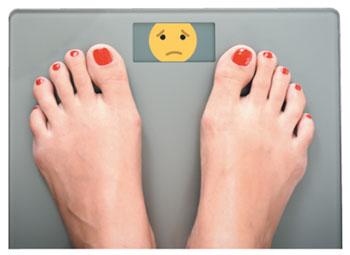

Over the holidays, just about everybody in the Triangle overeats. This article is about those for whom it's a serious problem.
In the U.S., more than four in 10 women are obese, compared to a little more than a third of men. Women are also more likely than men to experience weight-related discrimination. For example, many women of size hear that if they exercised self-control, they would lose pounds easily. For many, it is far more complex.
Weight-loss programs that involve reducing calorie intake and increasing physical activity produce an average 10 percent loss of starting weight within six months. Weight-loss medications and bariatric surgery produce more dramatic results than calorie reduction alone.
Ultimately, these methods require significant behavioral changes to permanently alter eating patterns, and lots of dieters regain lost weight without ongoing support. Many women have difficulty making changes to their dietary choices. For them, eating can be uncontrollable and changing eating habits long-term can seem impossible.
Like anorexia and bulimia, binge eating is a disorder with underlying emotional issues. According to mental health experts, binge eating disorder is the combination of the following: recurrent episodes of binge eating; a feeling of a loss of control during the binge; experiencing shame, distress or guilt afterward; and not using healthy compensatory measures to counter the binge eating. This disorder is relatively rare, affecting about two in 100 individuals in their lifetimes, but is three times more likely to affect women than men.
Many more people engage in periodic binge eating without having a full-scale disorder. The behavior of "eating when full" has significant consequences. Moments after an episode, the individual may experience gastrointestinal distress, nausea and sometimes even vomiting. Psychological effects include feelings of embarrassment, self-disgust, depression or guilt.
 Long-term binge eating also significantly increases the risk for excessive weight gain and obesity. Studies have found that up to one in five women who are obese struggle with episodes of binge eating.
Long-term binge eating also significantly increases the risk for excessive weight gain and obesity. Studies have found that up to one in five women who are obese struggle with episodes of binge eating.
An additional risk factor for obesity is emotional eating, which typically involves consumption of sweet, fatty, energy-dense foods in response to depression, anxiety or anger. This type of emotional eating is a strong predictor of weight gain.
While both women and men can eat emotionally, women typically respond to negative emotions, while men eat in response to more positive emotions.
Many of those who research obesity believe that addiction to highly processed, hyper-palatable foods could contribute to overeating and obesity. A compilation of clinical studies, including one with almost 200,000 people, showed that one in four overweight or obese individuals have characteristics of food addiction and that women are twice as likely as men to have food addictions. Furthermore, more than half of the people diagnosed with an eating disorder reports symptoms consistent with food addiction.
Treating obesity in individuals with these eating issues can be complicated. Through diet and exercise, people with binge eating patterns can benefit from the same behavioral treatments as those who do not engage in the practice. However, those who continue to binge lose less weight, and without long-term counseling, the disorder is likely to cause a regain.
Clinical trials are ongoing to test methods for treating people who engage in emotional eating. Given the current epidemic of obesity, it's critical to develop and test new ways to prevent and treat obesity in people with challenges in controlling the type and amount of food that they eat.
Anne McTiernan, M.D., Ph.D., is the author of "Starved: A Nutrition Doctor's Journey From Empty to Full."